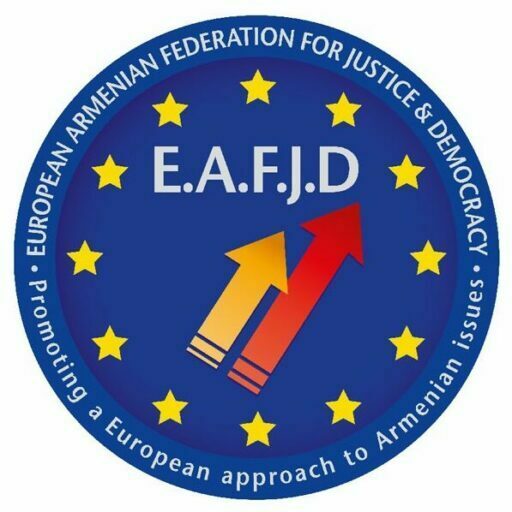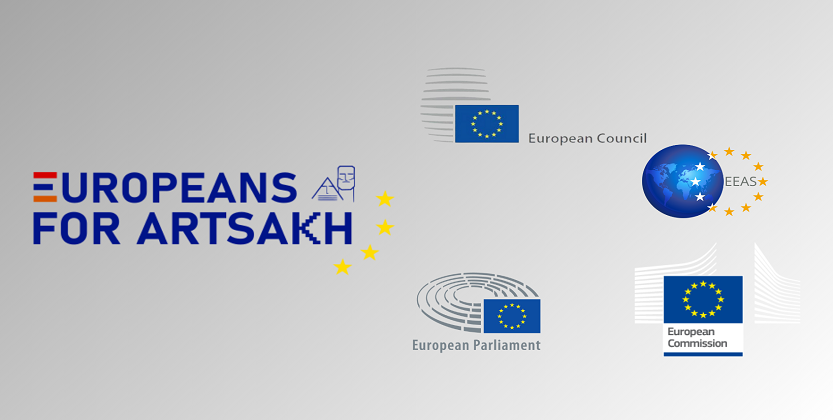3 April 2024
Subject: The Armenians of Nagorno Karabakh/Artsakh have the right to live collectively
Honourable Presidents of the European Council, European Commission and EU High Representative/VP,
Distinguished Heads of Government of the EU Member States,
As a result of Azerbaijan’s destructive policy towards Nagorno Karabakh/Artsakh since September 2020 the culmination of which was 19 September 2023, the indigenous Armenian population of Nagorno Karabakh – 150.000 people were uprooted from their homeland of millennia. The “methods” used by Azerbaijan for this were a full-scale war, blockade, starvation and psychological terror against the Armenian population. On 5 October 2023 the European Parliament (EP) adopted a resolution where it unequivocally condemns the ethnic cleansing of the Armenian population of Nagorno Karabakh by Azerbaijan. The EP resolution also expresses “deep dissatisfaction at the fact that regular alerts by Parliament regarding the situation in Nagorno-Karabakh and the risks of a catastrophic outcome have been disregarded by the Commission and the Council.
The European Union (EU), headed by President Charles Michel played a leading role as a principal mediator of the negotiations since 2021 up to the ethnic cleansing of the native Armenian population of Nagorno Karabakh/Artsakh. While emphasizing the necessity of protecting the human rights of the indigenous Armenian population of Nagorno Karabakh, the EU often publicly stressed the importance of the “integration” of the Armenian population of Nagorno Karabakh in Azerbaijan and advocated for it. The EU leadership backed this approach also while Azerbaijan was effectively starving the Armenian population, including 30.000 children, keeping them under total siege and carrying out military aggression. Moreover, while it was obvious who unleashed the war and who carried out aggression, the EU executive opted for “calling on both sides” to de-escalate the situation. This and the impunity in general encouraged Azerbaijan to continue its destructive policy.
Whereas the inaction of the Russian peacekeepers allowed Azerbaijan to carry out its heinous agenda, the EU also bears its share of responsibility for the reasons elaborated above. This does not refer to the European Parliament which honored its role as the House of democracy and continuously took an objective stance on the situation. As EU citizens we highly value the role of our MEPs in this regard.
After the ethnic cleansing by Azerbaijan, the native Armenian population of Nagorno Karabakh found refuge in the Republic of Armenia. While the Armenian Government has undertaken some steps to alleviate their short-term needs, this by no means meets the mid-term vital needs of tens of thousands of forcibly displaced Armenians from Nagorno Karabakh. The reality is that the combined efforts of diaspora Armenians, donors and the Republic of Armenia, a country without a strong economy, are not sufficient to enable a somewhat dignified life for the Nagorno Karabakh Armenians.
According to the official data published by the Republic of Armenia in the past 5 months, almost 8000 Armenians from Nagorno Karabakh/ Artsakh have already left the Republic of Armenia and have not returned. This is a real disaster. If the situation continues, with time the unique culture, dialects of the millennia-old indigenous Armenian population of Nagorno Karabakh will disappear. This is nothing less than a genocide.
We are grateful for the fact that the EU recently announced additional 5.5 million euros humanitarian aid to support Armenians displaced from Nagorno-Karabakh, in addition to 12.2 million euros announced in September 2023. In the meanwhile, the humanitarian aid is for short-term needs and does not address the above-mentioned issues.
Hence, as EU citizens we are appealing to the EU to earmark financial means to enable dignified housing in the Republic of Armenia for the forcibly displaced indigenous Armenian population of Nagorno Karabakh/Artsakh, until international protection mechanisms are put in place so that they can return collectively to their ancestral homeland, namely Nagorno Karabakh/Artsakh. After the disastrous earthquake in Armenia in 1988 international projects for new settlements/housing were implemented e.g. around the town of Spitak in Armenia. This could serve as an example. While the context is different, the goal is the same – to provide a dignified mid-term solution, and in this case prevent annihilation of a millennia-old culture.
The Armenians of Nagorno Karabakh/Artsakh have the right to live collectively. We do hope and expect the EU to help them exercise this right.
Sincerely,
Jonathan Spangenberg
Vorsitzender des Zentralrats der Armenier in Deutschland ( Chairman of the Central Council of Armenians in Germany)
Robert Unusyan
Président du Comité des Arméniens de Belgique (President of the Committee of the Armenians of Belgium)
Karen Tadevosyan
President of the Assembly of Armenians of Belgium
Sahak Chalakyan
Co-Chair of the Armenian Community in Bulgaria
Vartanoush Topakbashyan
Co-Chair of the Armenian Community in Bulgaria
Franck Papazian
Co-Président du Conseil de coordination des organisations arméniennes de France (CCAF)
Co-Chair of the Coordinating Council of Armenian Organizations of France
Aleksandr Sargsyan
Chair of “Urartu” Armenia-Czech Association
Vahan Aynedjian
Chairman of Diocesan Council of Armenian Community of Cyprus
Takvor Ovakimian
Chairman of the Central Committee of Orthodox Armenians of Greece
Baykar Svazlian
Chairman of the Union of Armenians of Italy
Katrin Hakopian
Chairwoman of the Union of Armenian Associations of Sweden
Zareh Nazarian
Vice-Chair of the Armenian Community of Romania
Kaspar Karampetian
President of the European Armenian Federation for Justice and Democracy (EAFJD)
Additional signatories of non- EU states
Armand Abramian
Chairman of the Armenian Community Council of the United Kingdom


